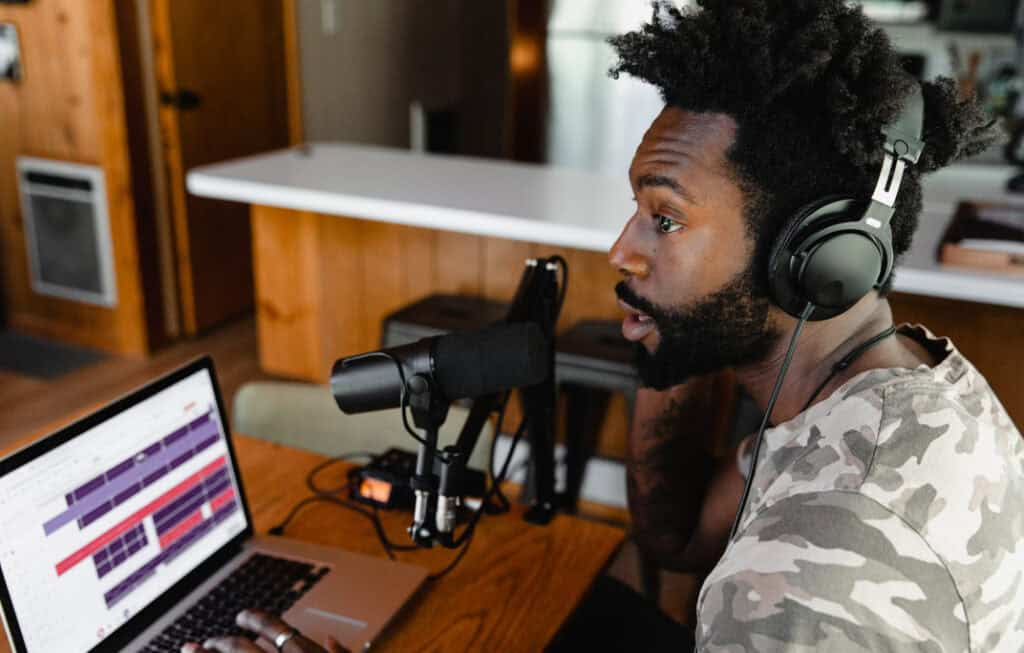When it comes to podcasting, how you interview your guests can change the game. Your interviewing skills can easily turn a dull episode into one that has listeners hooked and coming back for more.
Table of Contents
A great interview draws people in, keeps them entertained, and leaves them curious about your guest’s story. You know that feeling when you listen to a podcast and you just can’t wait to hear more? That’s the magic you want to create.
According to research, about 75% of podcast listeners say that engaging content keeps them tuned in. So, if you master those technique for podcasters to interview like a pro, you not only craft exciting episodes but also build a loyal audience that looks forward to your next chat.

Techniques for Podcasters to Interview
Do Your Homework
One of the first things you want to do as a podcaster is research your guest. When you know their background, work history, and recent projects means you can throw out some informed questions that really get the conversation going. You definitely do not want to come off as clueless or unprepared, right?
That would feel awkward for both you and your guest. You need to take the time to prepare, because it shows that you actually respect their time and expertise, and that’s something they will appreciate.
When your guest feels valued and understood, they are way more likely to open up and share juicy insights. This creates a relaxed vibe that leads to a more engaging discussion, and that’s what keeps listeners hooked.
Also, thoughtful questions lay the groundwork for diving deeper into interesting topics, which makes the podcast informative and genuinely entertaining.

Check Your Tech
According to podcast industry professionals at Lower Street, before you jump into the interview, it’s really important that you always remember to test your recording equipment. You don’t want any technical issues to mess up what could be a fantastic conversation.
Doing a quick sound check before your guest arrives can save you a ton of heartache later. It’s super simple—just take a minute to make sure everything is working properly, adjust any settings if needed, and you’ll feel more relaxed when the interview starts.
This small but relevant step also gives you the confidence that you’ll capture every juicy detail of your discussion without any hiccups.
The Importance of Open-Ended Questions
The next move should be to whip up some open-ended questions that encourage detailed responses from your guest. It comes down to steering clear of those boring yes or no questions.
You want to ask things that let your guest really dig into their thoughts and experiences. For example, instead of casually asking, “Did you enjoy your last project?” why not switch it up and say, “What did you enjoy most about your last project?”
Sounds simple, right? But what’s so amazing is that this slight tweak opens up the conversation and opens the door to interesting stories and insights that can truly grab your listeners’ attention.
When guests feel the freedom to share their thoughts, you’ll find they often reveal personal details that make the discussion way more engaging. These kinds of questions can also lead to a richer conversation that keeps the momentum going.
Listen Actively
Staying engaged and really listening becomes very important during interviews. You want to hang on to every word your guest says because this is what allows you to ask those follow-up questions that dig deeper into their thoughts.
When you show that you are interested, it builds a connection that makes the conversation flow even more naturally. Active listening can truly boost the quality of conversations; what this means is that when your guests feel heard and appreciated, they are often more willing to open up and share personal stories or insights.
This leads to a much richer discussion and can turn a good interview into an amazing one. So, when you focus on listening actively, what you do is you actually set the stage for a fantastic exchange of ideas, and your audience will definitely pick up on this detail.
Build Rapport
Before jumping into those hard-hitting questions, starting with some casual conversation is key to putting your guest at ease. You know that warm, cozy feeling you get when chatting with an old friend?
That’s what building rapport is all about—creating a connection that makes everyone feel comfortable. When you break the ice and create a relaxed atmosphere, it sets the stage for a much better conversation.
In other words, rapport basically means you’ve got that friendly vibe going on, where both you and your guest feel at ease. This connection makes them more likely to open up and share personal stories that can make your interview really captivating.
When people feel comfortable, they let their guard down, and that’s when the magic happens. Those genuine moments can lead to fascinating insights and relatable experiences that keep your audience engaged.
Be Ready to Pivot
You really need to stay flexible during the interview because conversations can take some pretty unexpected turns. And guess what? Those surprises often lead to the best insights and most interesting stories.
If your guest brings up a topic that’s intriguing or a direction that seems more exciting than what you planned, you definitely don’t want to be tied down to your script. Why? Because those spontaneous moments can turn into amazing pieces of conversation that keep both you and your audience engaged.
When you allow the chat to flow naturally, it feels more authentic; your guest opens up, and you might even discover something new about them that your audience will love. Also, a lively conversation feels way more enjoyable for everyone involved—listeners can sense that energy and excitement, and it keeps them hooked.
Manage the Flow and Invite Storytelling
Pacing the conversation is another essential technique. You want to manage the flow so that you can get into the depth of the topic while keeping things moving. A well-paced conversation prevents awkward lulls or rushed discussions.
When it comes to storytelling, encouraging your guest to share personal stories can lead to a more engaging interview. Stories create a connection with your audience. People remember stories way more than facts and figures. So, ask your guest about meaningful experiences in their lives, and watch how that brings your conversation to life.
Avoid Interruptions
Even if you might be itching to jump in with your thoughts, letting your guest finish their ideas before you speak is very important. When you interrupt, it can throw them off their game and might even come off as rude—no one wants that.
When you hold back and give them the space to express themselves fully, it shows you respect what they have to say. This little bit of patience can actually lead to better conversations too.
When guests feel like they can finish their thoughts, they’re more likely to share deeper insights or interesting stories. You might discover something unexpected that adds a lot of value to your interview.

Use Silence Wisely
It might sound odd, but those brief pauses after your guest finishes speaking can prompt them to dive deeper into their answers. Sometimes, when people finish their thoughts, they might need just a second to gather their ideas.
You would be surprised by what they might share when you give them that little nudge to keep talking! Maybe they’ll recount a cool story or provide insights they didn’t mention initially.
Those moments of silence can turn into gold, leading to richer conversations that keep your audience engaged. Plus, it gives a natural rhythm to the chat that feels comfortable and inviting.
Clarify and Summarize
If your guest gets into complex points, restating those points can be a lifesaver. This helps clarify their thoughts and allows your audience to follow along more easily. A quick recap ensures that everyone is on the same page.
End on a High Note
Always try to conclude with a positive or thought-provoking question because this leaves a lasting impression on your guest and your audience. Plus, a good ending can spark curiosity and excitement for future episodes.
Keep It Neutral
Staying neutral during the interview is key. Keep your tone and reactions unbiased to allow your guest’s opinions to take center stage because this simple yet crucial attitude is what creates an atmosphere where they feel free to express themselves.
Manage Your Time
Time management is crucial to keep your interview within the planned duration. Keep an eye on the clock to prevent discussions from dragging on too long – your audience will appreciate a well-timed episode.
Debrief After
Also, take a moment to reflect afterward. Debriefing allows you to think about what went well and what could be improved for next time. If you learn from each interview, you will only get better as a podcaster.
These 15 techniques can help you interview like a pro and create compelling podcast episodes that resonate with your audience. Each tip is a building block that contributes to a richer conversation. Simply put, when you put in the effort to improve your interviewing skills, you will create memorable experiences for both your guests and your listeners.



